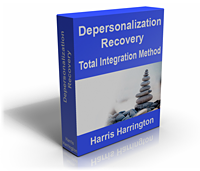Harris Harrington addresses questions related to seeking therapy for depersonalization disorder.
By Harris Harrington
How does one go about finding a therapist to treat depersonalization disorder? Is a therapist necessary? Are there advantages and disadvantages to therapy for depersonalization?
There are many questions that come to mind when thinking of how to treat and cure depersonalization as well as feelings of derealization. It has become a common occurrence for people with DPD to encounter therapists who are totally unaware of the existence of the disorder. This situation was mocked in Harris Goldberg’s movie Numb, in which the depersonalized protagonist (played by Matthew Perry) goes from psychiatrist to psychiatrist, therapist to therapist (some with credentials from Harvard), only to be prescribed useless medications, or to be given advice that didn’t work. It can be disheartening for someone with the disorder to experience this, as I have a number of times with different therapists.
If you suffer from DP you may be thinking to yourself “there’s no hope”. Having personally recovered from depersonalization without a therapist, I can tell you that there is plenty of hope for this disorder. A good therapist can be difficult to find, especially for such a poorly understood disorder, but it’s no question that a good therapist can help in recovery from depersonalization, though it isn’t necessary.
One of the biggest benefits of therapy is verbally and consciously processing emotional pain. This can be achieved via a dialogue with a therapist, or through developing a personal narrative in writing. I recommend that before you seek therapy you read my article on developing a personal narrative (something I go into in depth in my program). When you combine this personal exploration with therapy, the combination can be synergistic.
If you are just learning about depersonalization and derealization, I highly recommend you read my articles, watch my videos, and get my program to have a full understanding of what is going on. The advantage is that my program costs less than a single therapy session (not that the price of therapy should deter you from seeking it out), and it would take many sessions to learn what you learn from my program. With this knowledge you will actually be able to better understand DP, and will be more able to select a compatible therapist. If you apply the information in my program, you very likely will not need therapy for this disorder. The Total Integration Method is an extremely healing process. You are going to be hard pressed to find a therapist that will provide you with the level of help and expertise my program provides.
With that said, therapists, psychologists, psychiatrists, counselors, etc. are an extremely diverse group of people. Generalizations are difficult to make.
Depersonalization is a disorder caused primarily by trauma, in particular emotional abuse and neglect. Depersonalization is also a dissociative disorder. With these two things in mind, it’s important to find someone who is knowledgeable about both dissociation and trauma. Other areas of specialty could include borderline personality disorder (BPD), dissociative identity disorder (DID), and complex post traumatic stress disorder (C-PTSD). All of these disorders can have a somewhat similar pathogenesis.
In addition to background is the compatibility of the therapist’s personality with yours. This is an extremely important point. In recent years, the importance of the client-therapist relationship has come into greater focus among psychologists and academics. This relationship should be a therapeutic one, in which the client can work through his or her trauma in an accepting, yet challenging environment that promotes personal growth. This criterion of personal compatibility is an extremely subjective evaluation that must be made on your part. Another reason why the personal relationship is so important in depersonalization is because depersonalization is rooted in disorganized attachment.
Disorganized attachment is a pattern of thinking, feeling, and behaving that a person acquires in their first years of life as a result of the relationship with a primary caregiver. The client-therapist dyad should serve as a new healing attachment relationship, in which the depersonalized person’s emotions are being validated for perhaps the first time. Through the emotional attunement of a knowledgable and adaptable therapist, someone with depersonalization can finally develop a sense of self, and learn how to actually process their feelings. It is likely they were treated as an “it” growing up, instead of as a psycho-social-emotional human being, with subjective needs. In fact, a therapist could theoretically be less adequately educated, but provide superior therapy if they are more personally compatible.
You should also keep in mind the therapeutic approach, and schools of thought the therapist uses to treat his or her clients. Depersonalization is a multifaceted disorder, related to trauma, obsessive-compulsiveness, anxiety, and often comorbid with a number of personality disorders. A therapist that uses a number of different approaches is likely going to be a better choice.
You should also be on the look out for therapists that are manipulative (yes, they exist), or just cold and unempathic. It goes without saying that you should avoid such people.
But there are other issues in seeking out therapy unrelated to the quality of the therapist, or the necessity of therapy.
You may not even want to find a therapist, though if you are reading this article I am assuming you are at least curious. Many people with DP seemingly don’t want to improve by any means. They identify with DP. Sometimes they think of themselves as enlightened, and they invest a considerable amount of time filtering for information that confirms their feelings. Change can be difficult.
Another thing to consider is your current support system. If you currently lack a support system, and have no confidantes, mentors, or real friends that can provide any emotional support, a therapist is likely more necessary, though not necessarily for DP specifically. A therapist in this case can provide life direction and direct feedback for your particular situation. I recovered without a support system.
Social isolation, self focus, erratic sleeping schedules, loneliness, and addictive behaviors go together. Many people with DP acquire the disorder in their adolescence, an emotionally tumultuous time in which life direction is usually hazy, identity formation occurs, and leaving home for the first time to become an independent adult provides a number of challenges.
These realities are compounded by the lack of parenting depersonalized people usually receive. They are usually not taught how to deal with the real world, or how to become a fully functional adult. A good therapist can serve as sort of surrogate parent that can help you navigate through the world.
Modern, post-industrial Western society is in its very nature alienating. The freedom of mobility, and technological advancement has provided us with many benefits. But these benefits have been accompanied by a decline in social capital and social connection. Atomization and social isolation are rampant. Television, the internet, and increasing work hours have taken a drastic toll on our society. This is further exacerbated by the decline of religion and a vacuum of meaning people feel in their lives. Individualism has been taken to the extreme, leaving our collective needs behind.
These developments only increase the need for therapy in general. Does that mean that you specifically MUST seek out a therapist to cure DP? No. Most people in our society are not depersonalized, despite the stress.
There are a handful of therapists who specialize in depersonalization disorder such as Orna Guralnik in New York, Evan Torch in Atlanta, Elena Bezzubova in Laguna Beach, and Daphne Simeon in New York.
Another therapist who has caught my interest is Alan Rappoport, located in the San Francisco Bay Area. His clinical focus is on people who suffer from co-narcissism, meaning they had narcissistic parents. Narcissistic parents invalidate a child’s burgeoning sense of self, which leads to a number of problems. This emotional abuse is extremely common among people with depersonalization and derealization. Alan Rappoport is one of the few therapists to shed light on this extremely important, though often neglected topic. Note, however, that Alan Rappoport is not a specialist in depersonalization and does not treat this disorder.
Depersonalization never exists in a vacuum. There are a plethora of tangential issues in a depersonalized person’s life.
People with depersonalization suffer a fracture in their sense of self, and have also split off from the surrounding reality. Our sense of self is in large part derived through social interaction, and feeling that the world is unreal is a way to numb ourselves to a difficult life situation.
A therapist isn’t necessary for recovery from DP. Some therapists won’t be of much help, and you can spend a lot of money and time getting nowhere with a therapist. On the other hand, if you do your homework on the disorder, educate yourself, and find a good fit, therapy can be helpful.

